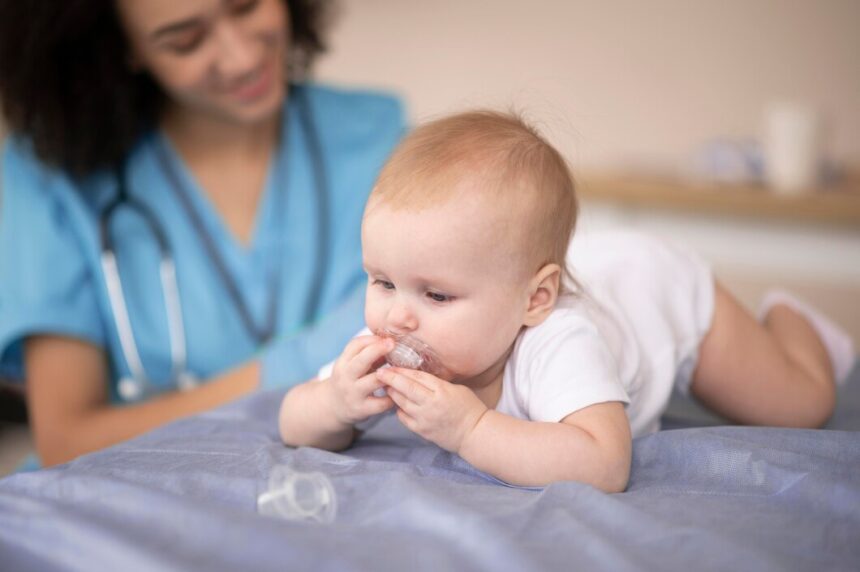Respiratory Syncytial Virus (RSV) is a common respiratory virus that can cause mild to severe respiratory illness, particularly in infants and young children. While RSV infections often resemble the common cold, they can lead to more serious complications, such as bronchiolitis and pneumonia, in vulnerable populations. Recognizing the early signs and symptoms of RSV in babies is essential for prompt diagnosis and appropriate medical care. In this article, we’ll explore the early signs and symptoms of RSV in babies, as well as discuss the importance of monitoring and seeking medical attention when necessary.
What is RSV?
RSV is a highly contagious virus that primarily affects the respiratory tract, including the nose, throat, windpipe, and lungs. The virus is most prevalent during the fall, winter, and early spring months, with outbreaks occurring in communities, daycare centers, and hospitals. While RSV infections can occur at any age, infants under the age of one, particularly premature infants and those with underlying health conditions, are at increased risk of severe illness.
Early Signs and Symptoms of RSV in Babies
The early signs and symptoms of RSV in babies are similar to those of the common cold or other respiratory infections. However, RSV infections tend to progress rapidly and can lead to more severe respiratory distress in vulnerable infants. Common early signs and symptoms of RSV in babies include:
- Coughing: Babies with RSV may develop a persistent cough, which can be dry or produce phlegm. The cough may worsen over time and interfere with feeding and sleep.
- Congestion: RSV can cause nasal congestion or stuffiness, making it difficult for babies to breathe through their noses. Nasal congestion may be accompanied by a runny or stuffy nose.
- Wheezing: Wheezing, a high-pitched whistling sound heard during breathing, may occur in babies with RSV due to inflammation and narrowing of the airways. Wheezing may be more noticeable during exhalation.
- Rapid or Labored Breathing: Infants with RSV may exhibit rapid, shallow, or labored breathing, especially during periods of activity or feeding. Increased respiratory effort may be a sign of underlying respiratory distress.
- Fever: Some babies with RSV may develop a fever, although not all cases present with elevated body temperature. Fever is typically low-grade but may fluctuate or spike in response to the infection.
- Irritability or Restlessness: RSV infections can cause discomfort and irritability in babies, leading to increased fussiness, crying, or difficulty sleeping. Babies may appear restless or agitated due to respiratory discomfort.
- Decreased Appetite: Babies with RSV may have a decreased appetite or show reluctance to feed, particularly if nasal congestion or respiratory distress interferes with breathing or swallowing.
- Poor Feeding or Reduced Fluid Intake: RSV infections can affect a baby’s ability to feed effectively, leading to poor feeding or reduced fluid intake. Dehydration may occur if babies are unable to take in adequate fluids.
- Lethargy or Weakness: Severe cases of RSV may cause lethargy or weakness in babies, characterized by reduced activity, diminished responsiveness, or difficulty maintaining wakefulness.
- Cyanosis: In severe cases of RSV, babies may exhibit cyanosis, a bluish discoloration of the skin or lips, indicating decreased oxygen levels in the blood. Cyanosis is a medical emergency and requires immediate medical attention.
When to Seek Medical Attention
Parents and caregivers should monitor babies closely for signs of respiratory distress or worsening symptoms and seek medical attention if any of the following occur:
- Difficulty breathing or rapid, shallow breathing
- Wheezing or persistent coughing
- Cyanosis or bluish discoloration of the skin or lips
- Lethargy, weakness, or difficulty waking
- Dehydration or reduced urine output
- Fever over 100.4°F (38°C) in infants under three months old
- Signs of dehydration, such as dry mouth, sunken eyes, or decreased tears
- Severe or persistent symptoms that worsen over time
RSV infections can pose a significant health risk to babies, particularly those under the age of one, and require prompt medical attention. While the early signs and symptoms of RSV in babies may resemble those of the common cold, vigilant monitoring and timely intervention are essential for preventing complications and ensuring optimal outcomes. Parents and caregivers should be aware of the signs of respiratory distress and seek medical attention if their baby exhibits any concerning symptoms. By staying informed and proactive, caregivers can help protect their babies from the potential impact of RSV infections and promote their overall health and well-being.










